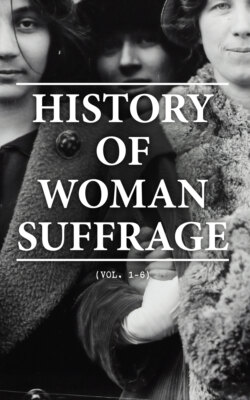Читать книгу History of Woman Suffrage (Vol. 1-6) - Various - Страница 35
На сайте Литреса книга снята с продажи.
FOOTNOTES:
Оглавление22. Mrs. Nichols had written up a case occurring among the subscribers to the Democrat, in which $500, the whole estate, was divided, the half of that amount being all the law allowed for the support of a woman, then in the decline of life, and sent fifty marked copies of the paper to members of the Legislature elect. One of them introduced the bill, which passed the first day of the session.
23. The violent throbbing of Mrs. Nichols' heart, caused by her unusual position and her intense anxiety that her plea might be successful, had stopped her speaking at the close of a brief preface to her plea. She, however, soon rallied, though her voice was tremulous throughout, from the conviction that only an eminently successful presentation of her subject, could spike the enemy's batteries and win a verdict of "just and womanly." Mrs. Nichols hoped no further than that. She did not expect conservative Vermont to yield at once for what she asked, as she stood alone with her paper among the press; and there was no other advocate in the State to take the field.
24. The head and front of the opposition was Judge Kingman, Chairman of the Judiciary Committee, to which, with the Committee on Elections, my petition was referred. He wrote the Report against granting our demand, and of those who signed it all but (Gen.) Blunt and himself were Democrats. The report was adopted by a solid vote of the Democrats (16), and enough Republicans to make a majority. Thirty-six Republicans and 16 Democrats comprised the whole delegation. If my memory is not at fault, 27 Republicans voted in caucus for the provisions which were ultimately carried in our behalf, which was a majority of the whole Convention. In caucus a majority were in favor of political rights; but only a minority, from conviction that Woman Suffrage would prevent admission to the Union, would vote it in Convention.
